Europe's demographic dilemma is well known. Like East Asia and to a lesser degree most of the Western Hemisphere, Europe's birth rates have fallen so far that the population is becoming unable to replenish itself. At the same time, longer life spans have undermined the poulation’s ability to withstand a growing old age dependency ratio, challenging the financial ability (and perhaps even willingness) of a smaller relative workforce in the decades to come. The EU-27 (excluding Croatia) over 65 population is projected by Eurostat to increase 75 percent relative to its working age population (15-64) between 2015 and 2050, more than either the 60 percent increase the UN projects in the United States and Japan (though Japan’s current ratio is much higher than the EU or the US).
This problem could be partially addressed by international migration, which could increase the size of labor force required to support expensive social welfare commitments. Our analysis of available Eurostat data (European Commission) data indicates that international migration to the European Union (EU) is strong. Further, migration has been shifting with the changing economic fortunes of EU nations, led by strong growth in the “heart of Europe” but slowing growth along much of the periphery of the former EU-15.This suggests that strong economic growth may be the key to solving, or at least ameliorating, Europe’s looming demographic crisis.
All EU-15 Nations have Attracted Migrants
Since the 2004 enlargement of the European Union, now at 28, with the recent addition of Croatia, the former EU-15 has attracted millions of international migrants, including many from the newer entrants to the original fifteen memnbers. Eurostat data indicates that nearly 11 million people more people moved to these nations between 2005 and 2012 than moved away.
The changes are stunning. All 15 nations have had net international migration gains since 2005. The leader is Italy, which has added a net 2.8 million international migrants, the equivalent of 4.7 percent of its population. This is more than Italy’s total population gain between 1975 and 2000. Spain has added 2.6 million net international migrants, the equivalent of 5.6 percent of its population. The United Kingdom added 2.0 million international migrants, the equivalent of 3.2 percent of its population.
Deep in the Heart of Europe
Perhaps most surprising are that gains the heart of Europe, six nations that established the European Coal and Steel Community in the early 1950s, which was to become today's European Union (Belgium, France, Germany, Luxembourg, Italy, and the Netherlands) (Figure 1).
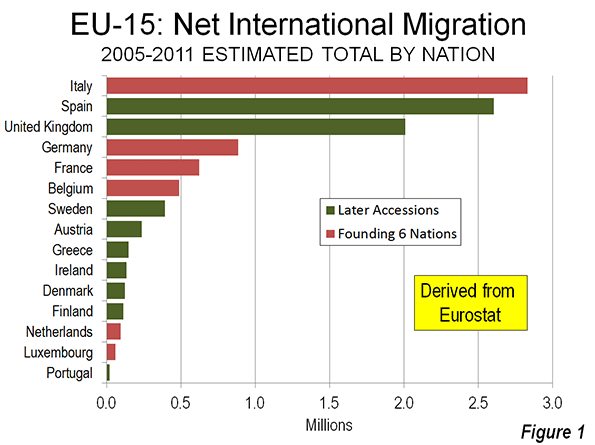
Germany and France had net international migration of 885,000 and 625,000 respectively. In both countries this was equal to one percent of the population. However, Belgium had the largest relative addition of international migrants. Its 490,000 net increase was equal to four percent of its population.
Overall, the six founding nations of the European Union attracted a net 5.0 million international migrants 2005 to 2012. This is more than the population of all urban areas in the six nations except for Paris, Milan and the Rhine-Ruhr.
Five additional economies, the United Kingdom, Austria, Sweden, Denmark and Finland added a net 2.8 million international migrants. Even Portugal, Ireland, Greece and Spain, despite their fragile economies, posted substantial gains, adding 2.8 net international migrants (Figure 2).
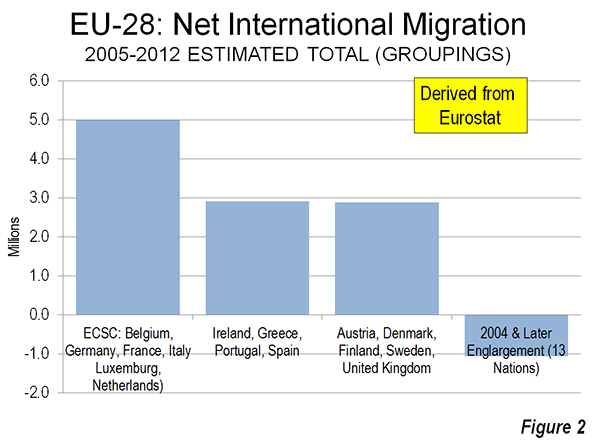
The PIIGS Minus Italy
Five nations have been designated the PIIGS by the international financial community, due to their financial reverses. These include Portugal, Ireland, Italy, Greece and Spain. All, except Italy, have seen their international migration rates fall precipitously. Between 2005 and 2011, these four nations combined added an average of 450,000 net international migrants. By 2012, they lost more than 275,000 net international migrants. In contrast, Italy, one of the EU founders, continued its strong trend, adding approximately 365,000 net international migrants in 2012, up from its 2005 to 2011 average of 350,000.
The six founding members picked up some of the “PIIGS minus Italy” losses. In 2012, these nations added nearly 885,000 net international migrants, which is well above their 585,000 average for 2005 to 2011. The other five nations (United Kingdom, Austria, Sweden, Denmark and Finland) fell to a 275,000 net international migration gain in 2012, compared to their 2005-2011 average of 370,000.
The new 13 members did much better than before, losing only 5,000 net international migrants in 2012. Their average from 2005 to 2011 was a 150,000 loss (Figure 3).
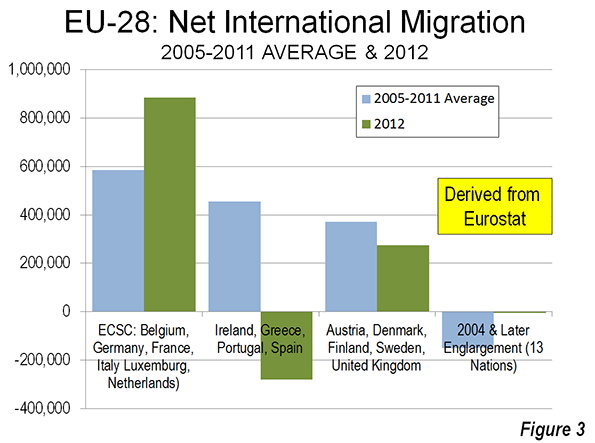
Ireland and Spain
Spain and Ireland illustrate the connection between declining economies and declining international migration.
The Irish Times noted in a recent article that the latest data from the European commission indicates that Ireland now has the worst net international outmigration rate in the European Union. Just six years ago, the Times reports, Ireland’s net international in migration rate was the highest in Europe. Over the past four years (Figure 4), Ireland has lost approximately 35,000 net international migrants annually (Ireland’s housing bubble and the resulting national financial crisis are described in Urban Containment and the Housing Bubble in Ireland).
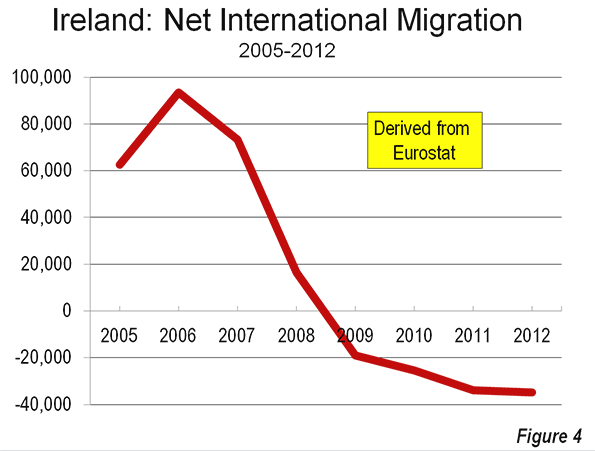
Spain's decline in net international migration has been every bit as spectacular. At its peak, Spain was attracting a net international migration approaching 800,000. Last year, Spain lost 165,000 international migrants (Figure 5).
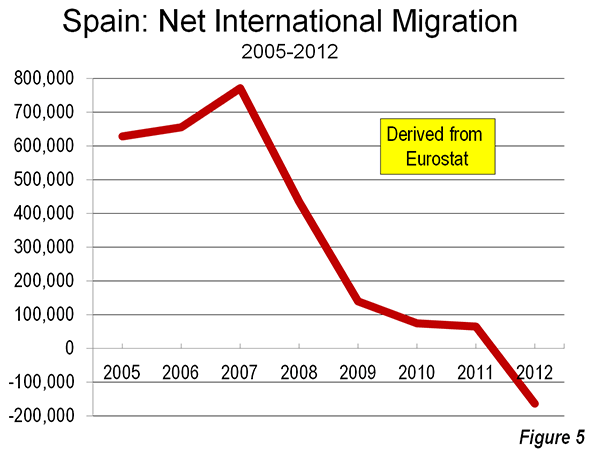
The 13 New Members
The net international migration gains in Europe’s heart have not been good news for Eastern Europe, where the newer European Union members are located. Overall, these nations lost approximately 1,050,000 international migrants between 2005 and 2012, though as noted above, the loss was minimal in 2012. This more recent improvement may be the result of weak economic conditions in many western and southern European countries.
Romania and Lithuania were the biggest losers. Romania lost nearly a net 1,000,000 international migrants, equal to nearly five percent of its population. Lithuania did even more poorly, losing 300,000 international migrants, nearly 10 percent of its population. Both nations lost overall population.
Migration and Economic Growth
Despite the resurgence of growth in the heart of Europe, the financial crisis has taken a toll. As in the United States, migration has fallen significantly, as many of the economic opportunities have dried up. By 2012, the net international migration to the EU-15 had been reduced to 900,000 from approximately 2 million in 2007. As throughout history, the demand for international migration is driven principally by the aspirations for a better quality of life. As a result, migration will tend to be greater where there is a wider gulf between the employment and economic opportunities in receiving countries than in countries that lose migrants.
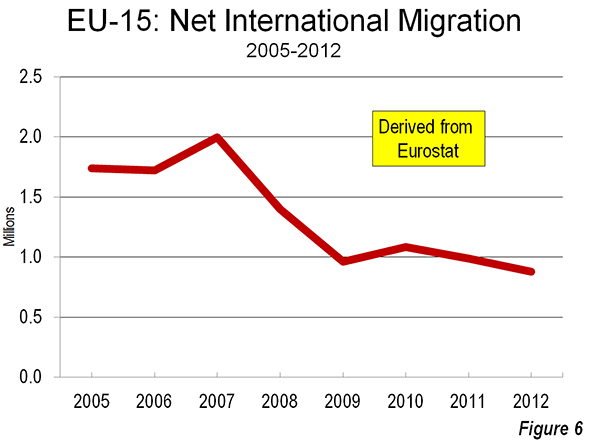
Wendell Cox is a Visiting Professor, Conservatoire National des Arts et Metiers, Paris and the author of “War on the Dream: How Anti-Sprawl Policy Threatens the Quality of Life.
Photo: Genoa, Italy (by author)













Why Work?
The immigration issue in the EU is the same as in the United States. There is always work to do and some work that has to be done. However, if one is paid not to work, then someone must be found to take his place. So, we have native born people who are entitled to generous benefits even if they are able bodied and "choose" not to do some kind of work to earn their wherewithal. Take away their stipends and then they must go to work or starve. But they vote and would vote the deniers of their benefits out of office right away. This is the dilemma of democracy and why democracy is a truly idiotic way to organize a society.
Europe is plagued by social disintegration and nihilistic birth rates. I think the next question after why work is why have children and after that why live. When I have traveled to Europe, I have a sense of a defeated people going through life's motions, but lacking in the spirit filled gusto so common out here in the Wild West. Yes, there is a feeling of the familiar, but the place seems to be devoid of any sense of the big questions. This is due to the after effects of the two world wars and the near century of both American and Soviet occupations.
The only hope that I see for the reemergence of any future form of Western Civilization lies in the resurgence of Russia and Central Europe. The Anglo-American-Israeli domination of the continent has to end as well as their puppet government in Brussels. A new confident Europe could occur with a bringing together of the talent and industrial know how of Germany and the labor resources of Poland and the Ukraine with the physical resources of Russia. This was what so many people thought would take place a century ago, but the conspiracies of the Anglo-American elite dashed those hopes with a century of war. Let us pray for peace and commerce and the end of the deleterious effects of the welfare state.
Curiouser and curiouser
I was nodding in agreement until I got to the bit about "the near century of American....(and Soviet)....OCCUPATIONS"......!!! And the last para.
I am not sure what you will make of Charles Murray looking at the same phenomenon as you are:
http://www.american.com/archive/2009/march-2009/the-europe-syndrome-and-...
The Europe Syndrome and the Challenge to American Exceptionalism
".....Scandinavia and Western Europe pride themselves on their “child-friendly” policies, providing generous child allowances, free day-care centers, and long maternity leaves. Those same countries have fertility rates far below replacement and plunging marriage rates. Those same countries are ones in which jobs are most carefully protected by government regulation and mandated benefits are most lavish. And they, with only a few exceptions, are countries where work is most often seen as a necessary evil, least often seen as a vocation, and where the proportions of people who say they love their jobs are the lowest.
What’s happening? Call it the Europe syndrome. Last April I had occasion to speak in Zurich, where I made some of these same points. After the speech, a few of the twenty-something members of the audience approached and said plainly that the phrase “a life well-lived” did not have meaning for them. They were having a great time with their current sex partner and new BMW and the vacation home in Majorca, and saw no voids in their lives that needed filling.
It was fascinating to hear it said to my face, but not surprising. It conformed to both journalistic and scholarly accounts of a spreading European mentality. Let me emphasize “spreading.” I’m not talking about all Europeans, by any means. That mentality goes something like this: Human beings are a collection of chemicals that activate and, after a period of time, deactivate. The purpose of life is to while away the intervening time as pleasantly as possible.
If that’s the purpose of life, then work is not a vocation, but something that interferes with the higher good of leisure. If that’s the purpose of life, why have a child, when children are so much trouble—and, after all, what good are they, really? If that’s the purpose of life, why spend it worrying about neighbors? If that’s the purpose of life, what could possibly be the attraction of a religion that says otherwise?
The same self-absorption in whiling away life as pleasantly as possible explains why Europe has become a continent that no longer celebrates greatness. When life is a matter of whiling away the time, the concept of greatness is irritating and threatening. What explains Europe’s military impotence? I am surely simplifying, but this has to be part of it: If the purpose of life is to while away the time as pleasantly as possible, what can be worth dying for?
I stand in awe of Europe’s past. Which makes Europe’s present all the more dispiriting. And should make its present something that concentrates our minds wonderfully, for every element of the Europe Syndrome is infiltrating American life as well.
We are seeing that infiltration appear most obviously among those who are most openly attached to the European model—namely, America’s social democrats, heavily represented in university faculties and the most fashionable neighborhoods of our great cities. We know from databases such as the General Social Survey that among those who self-identify as liberal or extremely liberal, secularism is close to European levels. Birth rates are close to European levels. Charitable giving is close to European levels. There is every reason to believe that when Americans embrace the European model, they begin to behave like Europeans......"
Another angle that might interest you, is that 3rd-world immigrants crowd into the more economically active cities in Europe, like London, and take low-paid menial jobs that Europeans won't - because Europeans won't crowd in ten to a room to be able to afford the disgraceful housing costs that utopian urban planning has caused. Staying on welfare and in a "social" house in Liverpool is a far more rational existence - the effective marginal tax rate of getting a job and losing the social housing, is well over 100%. Way to go, utopian urban planning. I bet we will see this effect in the unaffordable Pacific Coast cities too as time goes on with no respite for "priced out" local young people. At least they can flee to Houston; in the UK there is no Houston, and indeed, no affordable cities at all; and even worse, no chance anywhere of upward mobility. Utopian planning kills most local economies that are not unique ones like London (capital city, biggest centre of global finance anywhere in the world, biggest centre of international media, major tourism attraction).
I actually partly agree with you on Russia and Eastern Europe needing to come into their own, but Russians clearly are not Poles or Czechs, and that is the problem. Hence they vote in a Putin to follow the Yeltsin, not a Kaczynski to follow the Walesa, or a Klaus to follow the Havel.
As for the "near century of occupation"; had the USA done following WW1 what it did following WW2, there would have been no WW2. They were isolationist until 1941, which is quite a chunk of that "near century". Even a different policy to isolationism on the USA's part might have prevented WW2. But seeing the French wanted to be so vindictive to the vanquished Germans in 1918, the USA rightly (in a way) abandoned Europe to its own fate.
Any suggestion of moral equivalence between Western Europe and Iron Curtain Europe 1945 onwards, is repugnant raving lunacy; I do not know of anyone shot in the back, savaged by guard dogs, electrocuted, or left to bleed to death on a barbed wire fence trying to escape Western Europe for the East. Oh but of course the people of Western Europe were victims of "false consciousness", while the subjects of Communist regimes were all ungrateful closet bourgeoise. "Le Trentes Gloireuses", the French call the decades following WW2 - what would they know? What did Alexander Solzhenitsyn know? What do the Poles and Czechs know? Do the Russians export any cars as well-made as Skodas yet?